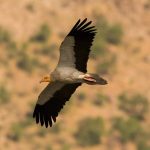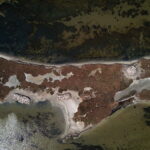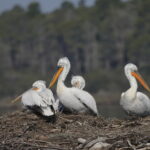Illegal Killing and Taking of Birds in Albania
According to Brochet et al (2016), Albania is listed among the most impacted countries from the illegal killing of birds with an average 265 000 birds killed per year. Approximately 30 000 – 40 000 birds are caught annually, 20% of which is thought to be traded in pet shops and the remainder are trafficked. The most threatened species from unlawful hunting methods are Common quail, Rock partridge, Common blackbird, and European goldfinch.
Over the third week of January, the team at Albanian Ornithological Society (AOS) conducted their field-monitoring visit to watch for cases of illegal killing and taking of birds throughout the pilot areas of the “Combating Illegal Killing and Taking of Birds” project, specifically – Semani river outlet and Thana Lake.
AOS field-team embarked on the routine monitoring visit early in the morning (7:30) from the “Semani river outlet” located within the borders of Divjaka-Karavasta National Park, where AOS field-team encountered 2 offenders setting up mist nets to catch Goldfinches. This case was directly and immediately reported to the National Park’s authorities and the State Police, and the respective authorities proceeded to penalize the offenders.
Following (12:30 pm), AOS field-team continued with monitoring by heading to the second pilot area of the projects, where they recorded 7 recently built hunting hides, 22 cartridges (10 of them were recently used) and 4 killed birds (Calidris alpina)- probably killed the previous night. Jointly, with, AOS and local authorities 5 of the 7 hunting hides were burned. Later on, the 2 remaining hunting hides were destroyed by the authorities.
Why is it important to combat illegal killing and taking of birds?
Controlling and combating illegal killing and taking of birds is a complex issue, even in a region where legal protection of birds is considered strong. To prevent the negative impacts of these poaching activities on endangered bird populations, further steps should be taken, including building cooperation among key responsible institutions, improving current hunting legislation and increasing awareness and a sense of responsibility among state institutions and society.
This field-monitoring visit was conducted within the framework of “Combating Illegal Killing and Taking of Birds” project supported by EuroNatur and MAVA foundation.





